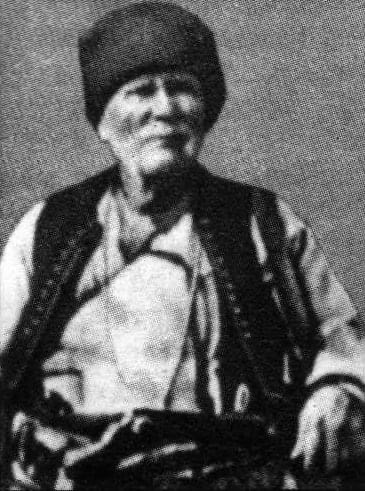Idriz Seferi
| Idriz Seferi | |
|---|---|
 |
|
| Nickname(s) | İdriz Bey |
| Born |
14 March 1847 Sefer, Kosovo Vilayet, Ottoman Empire |
| Died | 25 March 1927 (aged 80) |
| Allegiance |
League of Prizren League of Peja |
| Service/branch | Kachak |
| Years of service | 1878–1918 |
| Rank | Commander |
| Commands held | Gnjilane nahia Ferizovik area (1912) |
| Battles/wars |
Albanian Revolt of 1910 Albanian Revolt of 1912 Balkan Wars |
| Awards | Hero of Kosovo (posthumously) |
Idriz Seferi (Turkish: İdris Sefer; 14 March 1847 – 25 March 1927) was an Albanian nationalist figure and guerrilla fighter (rebel). A member of the nationalist League of Prizren and League of Peja, he was the right-hand man of Isa Boletini, with whom he organized the 1910 Uprising against the Ottoman Empire in the Kosovo Vilayet. After the suppression of the uprising, Seferi continued warfare, in the 1912 Uprising. In the First Balkan War, Boletini and Seferi rose up against Serbia, with whom they had previously been allies to during the 1910 and 1912 Uprisings, and continued to attack Serbian posts in the subsequent occupation and initial phase of World War I (1913-1915). In the second phase of the war (1916-1918), he led troops against Bulgarian forces.
Idriz Seferi was born in the village of Sefer in the north of the Skopska Crna Gora (in modern-day Preševo, south Serbia), at the time part of the Ottoman Kosovo Vilayet. He joined the Albanian national movements at an early age, being a member of the League of Prizren (est. 1878) and the League of Peja (est. 1899).
Before the general Albanian uprisings in the Ottoman Empire, Seferi had wanted to establish relations with the Serbian government; this was also done by Albanian chiefs in Yakova (Gjakova), Ipek (Peć) and in Montenegro. In 1909, the Serbian government aided the Albanian rebels with money and weapons.
In early April 1910, twelve Albanian tribes of the Kosovo Vilayet led by Isa Boletini and Idriz Seferi rose up against the Ottomans. 5,000 rebels under Seferi cut off the Pristina-Üsküp railway at Kaçanik, managing to resist the Ottoman forces at the gorge of the Kaçanik Pass. Seferi's men stopped a train carrying soldiers and supplies bound for Pristina, carried off the supplies and disarmed the soldiers. Boletini at the same time had led 2,000 rebels onto Ferizovik (Ferizaj) and Prizren. Seferi held the pass for more than a fortnight and inflicted heavy losses on the Turkish army despite the fact that they were without artillery. The rebels were only driven out after a desperate battle lasting thirteen hours, for they were greatly outnumbered. The uprising was quelled by the 16,000 Ottoman troops under Shefket Turgut Pasha, however not without difficulty. Under Seferi's command, some 2,000 Ottoman soldiers around Gnjilane were killed. By August, the Ottomans had reinstated order, and now the government took harsh measures to maintain suzerainty in the Kosovo Vilayet: all men aged 15–60 were registered (for conscription); Albanian men were disarmed and those eligible were conscripted into the Ottoman army. Boletini had given up arms after he and a Vıçıtırın state ambassador went to the Kosovo vali, who promised to meet his requests. Idriz Seferi then followed suit.
...
Wikipedia
